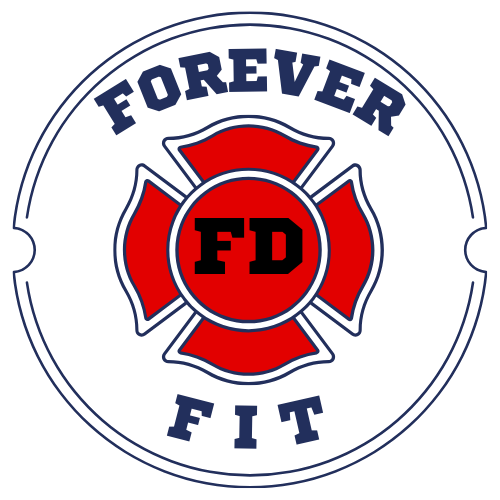Metabolism is like the engine that keeps your body running, converting food into the energy you need. For retired firefighters, understanding metabolism is key to effective fat loss. It’s a bit like learning how your fire truck operates; you need to know what makes it run smoothly so you can get the best performance out of it.

Career stress, irregular sleep patterns, and the demanding nature of firefighting can throw your metabolism out of whack. This can make losing weight trickier once you’ve hung up your boots. Your metabolism naturally slows down as you age, and the unique physical and mental demands of firefighting can exacerbate this effect.
Firefighter fat loss isn’t just about hitting the gym more often. It’s about a comprehensive approach that includes understanding how your metabolism works, making informed dietary choices, and incorporating regular physical activity. Think of it as preparing for a big fire—having the right tools and a well-thought-out plan makes all the difference.
Science backs up the importance of metabolism in weight management. Efficient metabolism turns calories into energy more effectively, helping you burn fat even when you’re not working out. Eating the right types of food, getting enough sleep, and managing stress are all part of optimizing metabolism for firefighters.
Addressing metabolic health in retirement means looking at the whole picture: what you eat, how you move, and even how well you sleep. It’s about taking the proactive steps to ensure your metabolism doesn’t just survive post-career, but thrives.
Effective Strategies to Boost Metabolism After Retirement
Boosting metabolism post-retirement involves some adjustments but the benefits are worth it. A balanced, nutrient-dense diet is a good place to start. Think of foods rich in proteins, healthy fats, and complex carbs. They’re like premium fuel for your body, keeping it running efficiently.
Tailored exercise routines are another key part. Focus on both strength training and cardiovascular exercises. Strength training builds muscle, and the more muscle you have, the more calories you burn—even when you’re resting. Cardiovascular exercises like walking, biking, or swimming help keep your heart healthy and your metabolism active.
Don’t underestimate the importance of rest and recovery. Quality sleep restores energy levels and aids in repairing muscles, which is crucial for maintaining a healthy metabolism. Try to stick to a regular sleep schedule and create a relaxing bedtime routine to improve sleep quality.
Hydration also plays a big role. Drinking enough water helps your metabolism work more efficiently and supports overall wellness. Aim for at least 8 cups a day, but more if you’re active or it’s hot outside.
Finally, consider integrating habits like mindful eating and stress management. Mindful eating means paying attention to what and when you eat, which can prevent overeating. Stress management techniques like meditation or yoga can significantly impact metabolic health by lowering cortisol levels, a hormone associated with fat storage.
Weight Loss Strategies for Retired Firefighters
Setting realistic and achievable weight loss goals is crucial. Rather than aiming for drastic changes overnight, focus on gradual and sustainable progress. Start with small, attainable targets and build from there. Celebrate each milestone as it comes.

Daily habits are the foundation of long-term success. Simple routines, like a morning walk, balanced meals, and regular hydration, can make a significant difference. Consistency is critical; what you do most days matters more than occasional bursts of effort.
Professional guidance can give you an edge. Fitness & nutrition coaches can provide personalized advice and keep you on track. Don’t hesitate to seek out experts who understand the unique needs of retired firefighters.
Technology can be a great ally in your journey. Fitness apps and trackers make it easier to monitor your progress, set reminders, and stay motivated. Find a tool that fits your lifestyle and preferences, whether it’s a smartwatch, a mobile app, or a simple pedometer.
Real-life success stories can be incredibly motivating. Hearing about fellow retired firefighters who have successfully managed their weight can inspire and give you practical tips they found helpful. These stories provide a sense of community and shared experience, making the journey feel less solitary.
Maintaining a Healthy Metabolism: Long-Term Tips
Adopting lifestyle changes that stick is key to maintaining a healthy metabolism after your firefighting days are over. Small, consistent changes can have a big impact over time. Focus on integrating health-conscious choices into your daily routine rather than drastic shifts.
Continuous education is vital. Stay updated with the latest health trends and research. Books, podcasts, and reputable health websites can provide valuable information to keep your strategy current and effective. Sometimes, what worked a year ago might need a tweak today.
Community support can be a game-changer. Surround yourself with like-minded individuals who share your health goals. Whether it’s a gym buddy, a walking group, or an online forum, having support makes the journey easier and more enjoyable.
Regularly monitoring your health indicators keeps you on track. Regular check-ups with your doctor, keeping an eye on your weight, and tracking your dietary habits help you stay informed about your progress. Quick adjustments can prevent minor issues from becoming significant setbacks.
Exploring alternative therapies and holistic practices can complement your traditional approaches. Acupuncture, massage, or even meditation can enhance your well-being and support metabolic health. Consider them as additional tools in your health toolkit.
Leave a comment with your thoughts!
